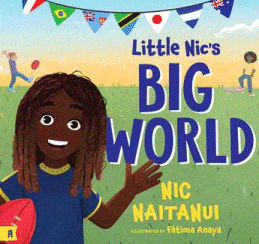
Little Nic’s Big World
Little Nic’s Big World
Nic Naitanui
Fátima Anaya
Albert Street Books, 2021
32pp., hbk., RRP $A19.99
9781761066061
At last, the day of the school fete has arrived and Little Nic is very excited because he has promised to make and donate his Fijian grandmother’s favourite cassava cake. For this fete, with its theme of “the world comes to us” being chosen by the children. is a celebration of all the different cultures of the students themselves and everyone is excited to share in the games, foods, music and traditions of the various countries.
But in the excitement of the traditional Welcome to Country, seeing his friends and joining in, Nic gets distracted and loses his backpack with its precious cake. Will he find it in time to contribute it to the community feast?
Nic Naitanui’s name will be familiar to those young readers who also follow AFL, particularly the West Coast Eagles, and that alone will spark interest in this story for many. But as we know, a famous name alone is not enough to carry a story so it is pleasing that this has a lot of substance to it as well. Told in a rhyme that underlines the rhythm of our speech, it is a celebration of things familiar and not-so and many young readers will be thrilled to see that their cultural elements have been included as Nic and his friends enjoy the offerings of the fete, while introducing them to their classmates. It opens up the opportunity for students to share their special talents and favourite things so that Nic’s school fete happens within their own classroom.
Tiny speech bubbles offer explanations of language where needed and there is also a list of things for the reader to look for as they help Nic search for that elusive school bag.
This is such a joyous celebration that the fun and excitement is almost palpable, and is a worthy follow up to Nic Nat’s first book, Little Nic’s Big Day in which he faces the fears of starting school, huge enough in itself without also being a child of colour. The children find only wonder and opportunity to share and learn in the different activities, as they do in real life, showing that prejudice and racism are learned adult attitudes.
